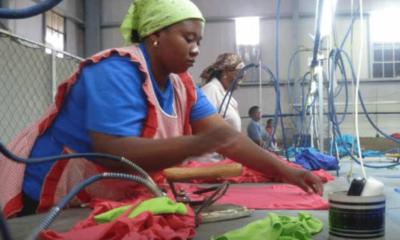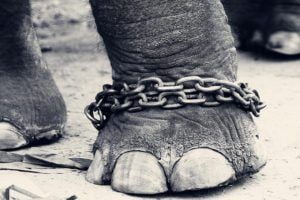

Environment
CITES Temporary Decision To Shut Worldwide Ivory Markets Is A Win For Elephants
A resolution has been adopted recommending the closure of domestic elephant ivory markets by parties at the 17th Conference of Parties at the Convention on International Trade in Endangered Species of Wild Fauna and Flora (CITES).
In response, Iris Ho, Wildlife Program Manager for Humane Society International, issued the following statement:
“Today’s interim decision recommending closure of domestic ivory markets worldwide is a resounding victory for the African elephant.
We hope that the plenary session next week will confirm this decision.
“We hope that the plenary session next week will confirm this decision. There is no excuse for any countries to continue their domestic ivory markets because legal ivory markets provide a convenient cover to launder illicit ivory and perpetuate the market demand. The choice is clear- either you are on the side of the African elephant or the side of the African elephant or the side of the elephant-decimating, wildlife-crime fuelling ivory trade.”
An in-session working group was formed last week to discuss two overlapping documents on the closure of domestic ivory markets submitted by the African Elephant Coalition (Doc.57.2) and the United States (Doc.27 Annex 1). The working group consisted of governments and NGOs who hold divergent views on the ivory trade. The governments in the working group3 included, but are not limited, to the United States, the African Elephant Coalition, Japan, Brazil, China, South Africa, Namibia and the European Union. After several meetings, the group reached a consensus on compromised text which can be found at: https://cites.org/sites/default/files/eng/cop/17/Com_II/E-CoP17-Com-II-06.pdf
Key elements of the compromise text:
- Recommends that all Parties and non-Parties in whose jurisdiction there is a legal domestic market for ivory that is contributing to poaching or illegal trade, take all necessary legislative, regulatory and enforcement measures to close their domestic markets for commercial trade in raw and worked ivory as a matter of urgency;
- Recognises that narrow exemptions to this closure for some items may be warranted; any exemptions should not contribute to poaching or illegal trade;
- Urges those Parties in whose jurisdiction there is a legal domestic market for ivory that is contributing to poaching or illegal trade and that have not closed their domestic ivory markets for commercial trade in ivory to implement the above recommendation as a matter of urgency.
- Requests Parties to inform the Secretariat of the status of the legality of their domestic ivory markets and efforts to implement the provisions of this Resolution, including efforts to close those markets that contribute to illegal killing or illegal trade.
On September 30, Japan’s Minister of Environment Yamamoto held a press conference in which he stated that the Japanese market does not comprise poached ivory. HSI’s Iris Ho said, “Evidence has pointed to laundering of ivory of illegal and unknown origins in Japan’s domestic market. There also have been instances of ivory smuggling from Japan to China. No ivory market exists in a vacuum. As a top investor in Africa, it is in Japan’s national and strategic interest to heed the African elephant range states’ plea to close ivory markets worldwide. We are disappointed by the Japanese government’s continued refusal to be part of the solution to protect an iconic species that is synonymous to Africa’s natural heritage.”


 Environment12 months ago
Environment12 months agoAre Polymer Banknotes: an Eco-Friendly Trend or a Groundswell?

 Features11 months ago
Features11 months agoEco-Friendly Cryptocurrencies: Sustainable Investment Choices

 Features12 months ago
Features12 months agoEco-Friendly Crypto Traders Must Find the Right Exchange

 Energy11 months ago
Energy11 months agoThe Growing Role of Solar Panels in Ireland’s Energy Future




























